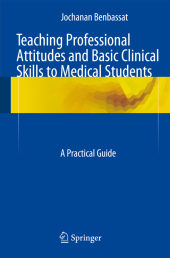 Neuerscheinungen 2015Stand: 2020-02-01 |
Schnellsuche
ISBN/Stichwort/Autor
|
Herderstraße 10
10625 Berlin
Tel.: 030 315 714 16
Fax 030 315 714 14
info@buchspektrum.de |

Jochanan Benbassat
Teaching Professional Attitudes and Basic Clinical Skills to Medical Students
A Practical Guide
1st ed. 2015. 2015. x, 143 S. 14 Tabellen. 235 mm
Verlag/Jahr: SPRINGER, BERLIN; SPRINGER INTERNATIONAL PUBLISHING 2015
ISBN: 3-319-20088-7 (3319200887)
Neue ISBN: 978-3-319-20088-0 (9783319200880)
Preis und Lieferzeit: Bitte klicken
This concise, easy to read title is designed for clinical teachers looking to refine their approach to teaching professional attitudes and basic skills to medical students. Doctors differ in values, training and practice setting, and eventually they adopt diverse approaches to patient interviewing, data collection and problem-solving. As a result, medical students may encounter significant differences in the clinical methods of their tutors. For example, some doctors encourage patients´ narratives by using open-ended questions while others favor closed-questions; and hospital- and community-based doctors may disagree on the value of the physical examination. Medical students may be puzzled by these differences and by controversies about issues, such as doctor-patient relations and the approaches to clinical reasoning.
This handy title is intended to help tutors address many of these issues, and to provide an approach not only to teaching patient interviewing and the physical examination but to teaching some clinically relevant topics of the behavioral and social sciences that are so vital to developing an effective, well-rounded physician.
TABLE OF CONTENTS
1. Introduction
2. Paradigmatic shifts in the theory, practice and teaching of medicine in recent decades
3. Teaching behavioral and social sciences to medical students
4. Difficulties in learning and teaching patient interviewing
5. Overcoming difficulties in teaching patient interviewing
6. Doctor-patient relations
7. Barriers to doctor-patient communication
8. Diagnostic utility of the physical examination and ancillary tests
9. Physical-examination skills: learning difficulties
10. Learning and teaching physical-examination skills by clinical context
11. Recording the clinical data base
12. Recording personal and social data and examination of asymptomatic persons
13. Recording the patient´s history
14. Intuitive vs analytic clinical reasoning
15. Should clinical training rely on role modeling?
Myers-JDC Brookdale Institute
The Smokler Center for Health Policy Research
Jerusalem, Israel
Formerly
Professor of Medicine and Chair of Medical Education Hadassah-Hebrew University Medical School Jerusalem and Professor of Medicine and Chair of Behavioral Sciences in Medicine, Faculty of Health Sciences, Ben-Gurion University, Beer-Sheva, Israel"


